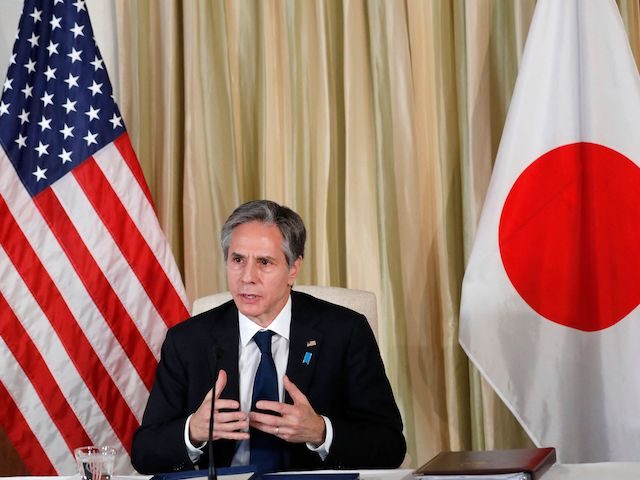U.S. Secretary of State Antony Blinken cautioned Tuesday that America would not standby if communist China resorts to “coercion and aggression” to get what it wants as he endeavored to use his first trip overseas to strengthen Asian alliances facing growing aggressiveness at the hands of Beijing.
Amid the deterioration of U.S.-Sino relations, the United States come out against what it described as China’s “unlawful” territorial claims in the East and the South China Sea have become a paramount security concern for Japan and other American allies in the region.
During a joint press conference with U.S. Secretary of Defense Lloyd Austin, Japanese Foreign Minister Toshimitsu Motegi, and the Asian country’s Defense Minister Nobuo Kishi, Blinken declared:
In Burma, the military is attempting to overturn the results of a democratic election and is brutally repressing peaceful protesters. China uses coercion and aggression to systematically erode autonomy in Hong Kong, undercut democracy in Taiwan, abuse human rights in Xinjiang and Tibet, and assert maritime claims in the South China Sea that violate international law.
We’re united in the vision of a free and open Indo-Pacific region, where countries follow the rules, cooperate whenever they can, and resolve their differences peacefully. And in particular, we will push back if necessary when China uses coercion or aggression to get its way.
The secretary of State’s comments came ahead of the first meeting between Biden administration officials and their Chinese counterparts in Alaska on Thursday. Both sides will discuss the eroding relations between the top two economies in the world.
U.S. officials have lambasted Beijing for trying to coerce its neighbors with competing interests. Meanwhile, China has criticized what it has described as U.S. efforts to encourage unrest in the region and interferer in the Asian giant’s internal affairs.
Referring to the U.S.-Japan discussions on Tuesday, Japanese Foreign Minister Toshimitsu Motegi declared:
We were able to renew the unwavering commitment towards the alliance. Based upon the notion that our alliance is the very foundation for regional peace, stability, and prosperity, we agreed that Japan and the United States will continue to collaborate with like-minded nations, including Australia and India, to promote a free and open Indo-Pacific.
Further, we reconfirmed the strong commitment of the United States regarding the defense of Japan using all types of U.S. forces including nuclear. … We agreed on the recognition that China’s behavior, where inconsistent with the existing international order, presents various challenges to the alliance and the international community. We remain opposed to any unilateral action that seeks to change the status quo, including in the East and South China Seas.
Motegi and his colleague Japanese Defense Minister Nobuo Kishi hosted Tuesday’s meeting in Tokyo.
The U.S. and Japanese officials also discussed North Korea’s threat, with Blinken noting that Pyongyang has refused to engage in dialogue with Washington.
“We have no greater strategic advantage when it comes to North Korea than this alliance, and we’ll approach that challenge as an alliance,” Blinken told reporters. “And we’ve got to do that if we’re going to be effective.”
“We strive for the realization of complete denuclearization of North Korea,” Motegi added.
The U.S. and Japan stressed the importance of working closely with Japan and South Korea towards North Korea’s denuclearization.
In defiance of United Nations resolutions and U.S. sanctions, North Korea has pursued nuclear and missile programs.
According to state media, North Korea has warned the Biden administration against “causing a stink” if it wants to achieve peace in the region.
Blinken vowed to maintain “the basic principle” of former President Donald Trump’s tough approach to China during his confirmation hearing.

COMMENTS
Please let us know if you're having issues with commenting.